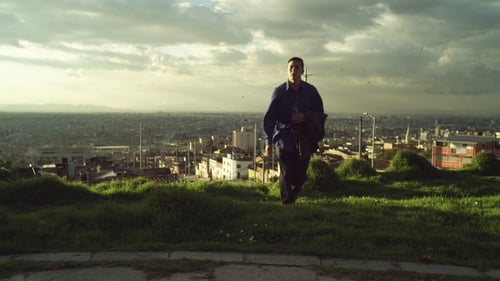
Writer
Although she's not completely convinced, Sandra plans to leave. Héctor, who wants to get close to her again, walks with her for a lonely road carring her bags until the bus stop to wait for a ride.

Director
Although she's not completely convinced, Sandra plans to leave. Héctor, who wants to get close to her again, walks with her for a lonely road carring her bags until the bus stop to wait for a ride.

Location Manager
Leonidas used to have a restaurant with his wife before she left him a long time ago. While playing pool -his only hobby-, a police officer asks him to receive and serve a meal to an outsider. Several deaths in neighboring towns will very soon alert Leonidas about the visitor.

Producer
A man in chains, a young man who dreams of being part of something, to become a militant for an armed group who must wield a cruelty in which he may not believe in. The characters, each voluntary or involuntary part of a mechanism that overcomes them, reveal their greatness or misery in the “minimum” tasks that they perform to survive. From that sometimes morbid poetry of the everyday and the irrefutable truth of the details, we see a country whose social body is sick and injured.

Production Controller
A man in chains, a young man who dreams of being part of something, to become a militant for an armed group who must wield a cruelty in which he may not believe in. The characters, each voluntary or involuntary part of a mechanism that overcomes them, reveal their greatness or misery in the “minimum” tasks that they perform to survive. From that sometimes morbid poetry of the everyday and the irrefutable truth of the details, we see a country whose social body is sick and injured.

Guerrillero 1
A man in chains, a young man who dreams of being part of something, to become a militant for an armed group who must wield a cruelty in which he may not believe in. The characters, each voluntary or involuntary part of a mechanism that overcomes them, reveal their greatness or misery in the “minimum” tasks that they perform to survive. From that sometimes morbid poetry of the everyday and the irrefutable truth of the details, we see a country whose social body is sick and injured.

Location Manager
Luis Alberto Gaitán "Lunga" was a photographer from Guateque, Boyacá. He is the author of the most iconic pictures of the Colombian political leader Jorge Eliécer Gaitán, assassinated in 1948, giving birth to one of the cruellest waves of violence in the country. Since ever, Lunga's photographs have been reproduced over and over again without the proper credits. This film is a trip to the 40's and 50's Colombia's decades and it wants to give to Lunga the recognition of his work and his name in the history of Colombia as a photographer.






